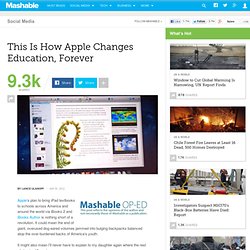

How A Classroom Of iPads Changed My Approach To Learning. Recently, my wife and I had the opportunity to take our kids on an overseas family holiday. About a third of the way through our trip as I tiredly walked to yet another airport terminal, I found myself thinking, “I know how check-in works. Someone at a counter will tell me what to do, so I can turn off and just go with it.” On entering the terminal, we found self check-in kiosks and one distinctly disinterested attendant hiding behind a counter at the far end of the hall.
We struggled through the process – our first encounter with such a system – telling each other what to do, making a simple process much harder than it really needed to be. It occurred to me later that my prior experience and expectations had made it harder to adjust my thinking. We tend to rely on what we know as one way to manage demands on our time. This anecdote serves as an illustration of an important realization made at this stage of our journey with iPads in learning at Redlands College . Apps & The App Store. This Is How Apple Changes Education, Forever. Apple’s plan to bring iPad textbooks to schools across America and around the world via iBooks 2 and iBooks Author is nothing short of a revolution.

It could mean the end of giant, overused dog-eared volumes jammed into bulging backpacks balanced atop the over-burdened backs of America’s youth. It might also mean I’ll never have to explain to my daughter again where the rest of chapter 16 went. A couple of months ago, my 13-year-old junior high-school-attending daughter was diligently plowing through piles of homework. Part of it involved reading a chapter in her Social Studies text book and then answering questions on a worksheet about what she read. However, when I looked over at my daughter, she had her head of curls in her hands.
“I can’t finish my homework,” she said without looking at me. “Why not?” “Here.” I stared at it uncomprehending. “What’s wrong with it?” “The…pages…are…missing,” she said slowly as if speaking to a particularly dense child. Tired Old Textbooks Questions. A proposito di libri di scuola. Le tecnologie digitali a scuola sono adottate con tempi più lunghi e percorsi meno lineari di quanto servirebbe, a giudicare dai commenti al post precedente. E in effetti tutta la vicenda del cosiddetto elearning è stata una serie di false partenze. Il problema è probabilmente di approccio: non partire dalle tecnologie ma dall’intelligenza della relazione tra la cultura dell’educazione e la società che ha bisogno di educazione.
Di certo, in un contesto di crisi di ogni autorità tradizionale, nel quale le forme di apprendimento informale si moltiplicano e spiazzano le forme di apprendimento formale, la ricerca va indirizzata nella ricostruzione di una relazione di fiducia e rispetto, condita dell’abilità di interessare a ciò che è importante, alla qualità, alla corrispondenza tra apprendimento e qualità della vita. I nuovi strumenti peraltro si moltiplicano anche grazie alla capacità di sperimentazione degli insegnanti di buona volontà. I libri di scuola stanno per cambiare. L’editoria digitale, l’attività dell’insegnamento e soprattutto la pratica dell’apprendimento stanno già cambiando. Ma le conseguenze sintetiche del fenomeno non si sono ancora palesate in pieno. L’elearning è andato avanti a grandi annunci e grandi flop per troppo tempo.
Forse perché non riusciva a staccarsi dall’idea barbosa di simulare le aule con i computer. Ma ormai le cose si stanno aggiustando. Kahn Academy è già un enorme successo nella ridefinizione del modo di insegnare/imparare la matematica. Chissà che l’annuncio della Apple, previsto per il 19 gennaio non dia qualche nuova ulteriore indicazione alla prospettiva che abbiamo davanti in questo fondamentale settore.